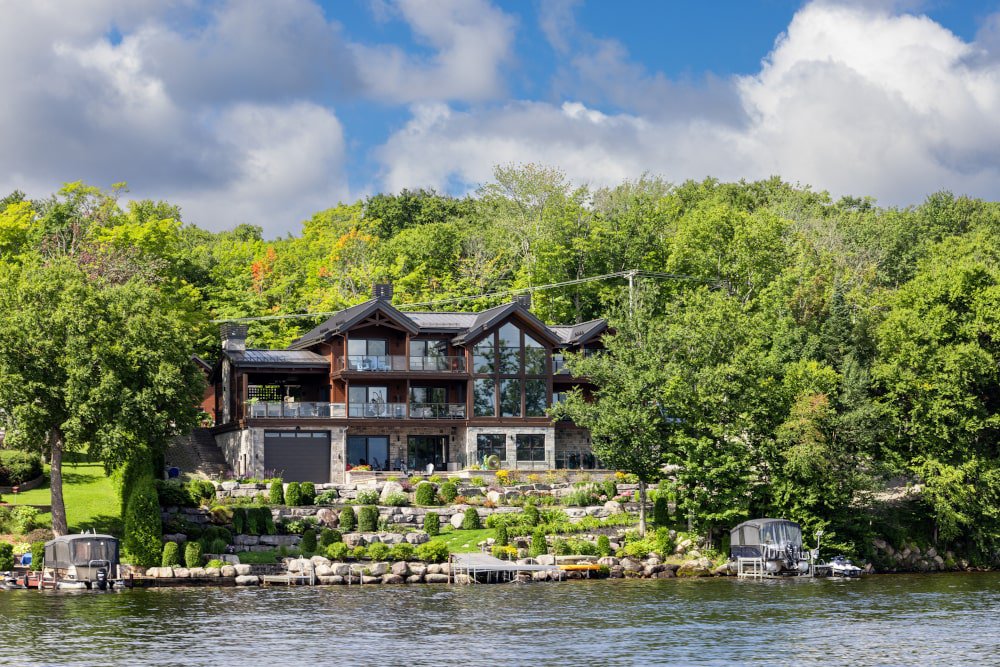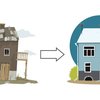Mortgage for a Luxury Property in Canada

Purchasing a luxury property in Canada is more than a financial investment—it’s a lifestyle decision involving meticulous planning, significant resources, and a full understanding of the mortgage process. Whether you’re looking to buy an extensive estate, a beachfront villa, or a city penthouse, financing for luxury real estate is distinct from standard home buying. This guide covers the essentials of securing a luxury mortgage in Canada, including key factors like down payments, credit requirements, and unique financial considerations for high-value properties.
Understanding What Luxury Means
In real estate , "luxury" extends beyond a price bracket. Luxury homes are defined by their exemplary craftsmanship , unique architecture, and premium amenities in prime locations. These properties are found in the most desirable areas, whether it’s the vibrant downtown of Toronto or Vancouver , or the serene landscapes of Muskoka Lakes or Whistler.
Case Scenario:
For example, purchasing a penthouse in Toronto involves financing considerations like high down payments and specific property appraisals due to its prime urban location and amenities. Conversely, a lakeside estate in Muskoka might require an advanced appraisal due to its unique natural setting and seclusion, affecting the mortgage terms.
According to Ruth Dayan , a mortgage agent specializing in luxury real estate, “When buying luxury property, it’s not just about the price tag. Buyers need to understand that unique factors like property exclusivity, high-quality materials, and location-specific taxes can all affect the final mortgage approval.”
What makes a property a luxury property is its exclusivity and attention to detail. Constructed with high-quality materials, many come with advanced features like smart home systems and provide a level of privacy that’s simply unmatched. The demand for luxury homes is growing across Canada, driven by both domestic and international buyers who seek not only a home but an elevated lifestyle.
Types of Luxury Properties
Luxury properties in Canada come in diverse forms, each offering distinct features and amenities. Here’s a look at some common types on the Canadian market:
| Property Type | Location Examples | Key Features |
|---|---|---|
| Urban Luxury Homes | Toronto, Vancouver, Montreal | Cityscape views, high-end amenities, exclusive access |
| Country Estates | Muskoka, Okanagan Valley | Large plots, private docks, outdoor recreation |
| Waterfront Properties | Muskoka, Georgian Bay | Lakeside views, private docks, connection to nature |
| Vacation Homes | Whistler, Mont-Tremblant | Proximity to outdoor activities, high comfort |
| Ski Chalets | Banff, Whistler | Panoramic mountain views, saunas, and heated pools |
Each type caters to a different lifestyle, offering a variety of choices for high-net-worth individuals seeking to invest in Canada’s premium real estate market.
How to Get a Mortgage for a Luxury Property
Securing a mortgage for a luxury property in Canada involves a more complex and rigorous process than conventional home loans. Key factors to consider include:
| Feature | Standard Mortgage | Luxury Mortgage |
|---|---|---|
| Down Payment | 5-20% | 20% or higher |
| Credit Score | 600-700 | 700-760 |
| Income Verification | Standard | Detailed and higher income needed |
| Appraisal Complexity | Basic | Advanced, may involve multiple appraisals |
| Loan Options | Standard (Fixed/Variable) | Custom (Jumbo, Interest-Only) |
| Interest Rates | Competitive | Higher due to property value risks |
- Higher Down Payments : Luxury mortgages typically require higher down payments. While standard mortgages permit down payments as low as 5% for properties under $1 million, luxury properties generally require at least a 20% down payment . This amount may vary based on the lender’s evaluation of the property and your financial profile.
- Stricter Financial Requirements : Luxury home lenders impose more stringent requirements. Generally, applicants need a credit score between 700-760, along with an income stream exceeding $100,000 annually and a debt-to-income ratio below 30% .
Underwriter & Mortgage Broker, Linda Mac explains, “ Lenders assess luxury buyers with a microscope, often requiring evidence of a strong income stream, low debt ratios, and significant liquid assets to secure the best terms. The goal is to ensure buyers can handle not only the mortgage but the higher maintenance and tax costs associated with luxury properties. ”
- Valuation and Property Appraisals : Appraising luxury homes is more complex than appraising standard single-family homes. Lenders often require advanced appraisals to confirm that the property value justifies the loan amount, thereby protecting against market fluctuations. For example, a unique property design or rare materials may significantly impact the appraisal and final mortgage terms.
- Interest Rates and Custom Loan Products : Due to the perceived risk, luxury mortgages often carry higher interest rates. Financing options might include interest-only mortgages or jumbo loans specifically structured for high-value properties. An interest-only loan allows payments on interest alone for a defined period before requiring full payments, while jumbo loans address high property valuations that exceed standard loan limits as set by Canadian mortgage insurers .
Knowing one’s financing options and understanding the complexities of luxury mortgages can ensure that buyers secure terms aligning with their financial capacity and lifestyle goals.
Additional Costs of Luxury Properties
Luxury properties often involve higher costs beyond the mortgage itself. Below are typical ongoing expenses that luxury homeowners might expect:
| Expense Type | Standard Home (Approx.) | Luxury Property (Approx.) |
|---|---|---|
| Property Taxes | 1-1.5% of home value | 1.5-2.5% of home value |
| Home Insurance | $800-$1,500 annually | $2,500-$5,000+ annually |
| Maintenance Costs | $500-$1,000 annually | $5,000-$10,000+ annually |
| HOA/Condo Fees | $100-$300 monthly | $500-$1,000+ monthly |
| Utilities (Heating, etc.) | Standard rates | Higher due to size and amenities |
Conclusion
Buying a luxury property in Canada is a significant investment that requires focused financial planning and expert guidance. Customizing financing to your specific needs and protecting your investment over the long term is essential.
“ A luxury mortgage isn’t one-size-fits-all,” says Ora-Lea Dayan , Mortgage Agent. “Each high-net-worth buyer’s financial goals and lifestyle are different, and selecting the right financing is critical to making the most of your property investment.”
Whether you’re preparing to buy a luxury penthouse in Toronto or retire in a ski chalet in Whistler, Clover Mortgage can help you navigate the mortgage process with confidence and ease. Reach out today to explore how we can help secure the perfect mortgage for your dream property.
Frequently Asked Questions
What defines a luxury home?
A luxury home is defined by unique features, prime location, and high-end finishes. Typically located in prestigious neighborhoods, these homes offer exceptional privacy and may include amenities like smart home technologies, spacious layouts, custom architecture, and high-quality materials. In Canada, luxury homes generally occupy the top 10% of the market, with values often starting in the multi-million-dollar range, depending on the region.
What type of property is the most expensive?
The most expensive properties generally include detached estates on expansive plots, waterfront homes, and residences in highly sought-after areas. Examples might include mansions overlooking the ocean in Vancouver or custom-built homes in Toronto’s elite neighborhoods, often featuring pools, large outdoor areas, and high-end interior finishes.
Can a small house be luxurious?
Yes, luxury isn’t defined by size but by quality. A smaller home with high-end finishes, custom architecture, and advanced technology can still qualify as luxurious. Many luxury properties today emphasize efficiency, offering exclusivity within a smaller footprint through premium appliances and materials.
What style of home has the highest resale value?
Homes with timeless designs, superior construction, and locations in prestigious or high-demand areas generally retain the highest resale values. This includes traditional styles like Colonial and Georgian as well as contemporary designs that emphasize open space and natural light, consistently maintaining their worth.
How do international buyers approach luxury mortgages in Canada?
International buyers can secure luxury mortgages in Canada, though the process may involve additional steps. Most lenders require a substantial down payment (often 35% or more) for non-residents, proof of financial stability, and may impose additional documentation requirements. Working with a Canadian mortgage advisor familiar with international financing is highly recommended.
| Requirement | Domestic Buyer | International Buyer |
|---|---|---|
| Down Payment | 20%+ | 35% or higher |
| Documentation | Standard ID and income docs | Additional proof of foreign income |
| Tax Implications | Standard property taxes | Potential foreign buyer taxes |
| Credit Score | 700-760 | May vary based on country of origin |
| Approval Time | Standard processing times | Longer due to additional checks |
What financing challenges do buyers face with luxury properties?
Common challenges include higher down payment requirements, stringent income verification, and the complexity of property appraisals. The unique attributes of luxury homes—such as custom designs, high-end materials, and rare features — can lead to unpredictable valuations, which may impact loan approval and terms.
Can luxury mortgage rates be negotiated?
Yes, there is often room to negotiate mortgage rates and terms for luxury properties, especially for high-net-worth individuals. Having a strong financial profile, a substantial down payment, and working with a skilled mortgage broker can increase negotiating power with lenders, potentially securing better rates or customized loan products.
Are there tax implications for owning a luxury property in Canada?
Yes, luxury homeowners may face higher property taxes based on the assessed value of the property, especially in high-demand areas. Additionally, non-resident buyers may be subject to foreign buyer taxes in some provinces. Consulting with a tax advisor familiar with Canadian real estate can help in understanding all tax obligations.
What is a jumbo loan, and when is it needed?
A jumbo loan is a type of mortgage designed for properties with valuations exceeding conventional loan limits. In Canada, these loans are often used for luxury properties that exceed the average home price and are tailored with terms and conditions suited to high-value assets. Jumbo loans typically come with unique requirements, such as higher credit scores and substantial down payments.





